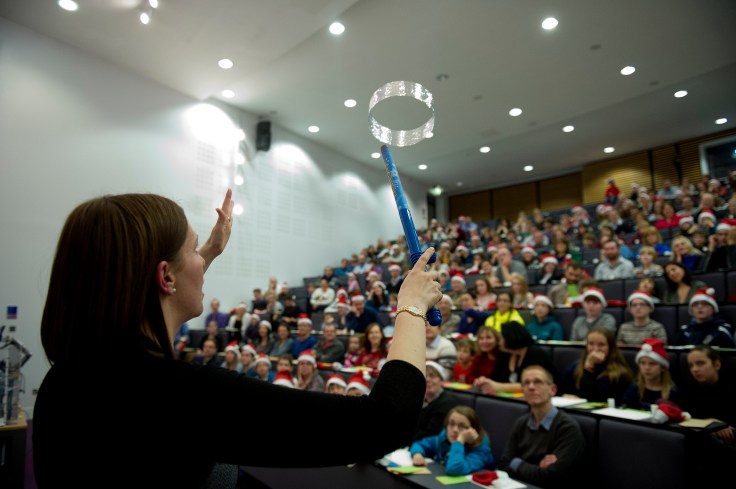Presenting at conferences to share our research is part of our life as a PhD student. It is natural to have butterflies in our stomach if it is our first time doing a public presentation. However, even for some experienced speakers, presenting at conferences could bring huge pressure, since anyone could be among our audience, including those who we want to impress. In this Blog, Ivy will share her experiences of presenting at conferences and the practical tips on how to get ourselves well prepared for our first professional conference debut.
As a PhD student, we all have our area of interest and the passion to share our research with others. For a more professional purpose, nothing is better than presenting at academic conferences. Opportunities like these would support us to get fresh insights into our research and introduce ourselves to the academia by networking with other conference participants. Therefore, it is of vital importance that we make the most out of these opportunities.
Up to now, I have attended over ten academic conferences and done three conference presentations. Some of the conferences were online and some onsite; some based in the UK and others outside of the UK; some of district level and some of the international level. Before I move on to sharing the tips on presenting at conferences, I would like to share two of my own experiences in this regard, as representative examples.
Experience 1: Onsite, International conference, Austria
An onsite conference could be a bit more daunting since we would be the focus in a room. This was also my first conference presentation outside the UK, in the country where I was visiting for the first time. Unfamiliarity with the setting struck a bit of anxiety into me. Nevertheless, the presentation went well and ended with a heated discussion with my audience.
Experience 2: online, international conference, the UK
This was my first online conference presentation and inevitably, I needed to cope with some technology issues that would not have been so prominent or relevant if it were an onsite one. Regardless of this, the presentation also ended well with many interesting questions from the audience.
Based on my own understanding of a good conference presentation as well as the successful lessons I gained from the two experiences above, here are the tips on presenting on conferences.
Preparing the slides/poster accordingly
It is surely a time to celebrate when our email receives the notice that our abstract got accepted and would be scheduled either for a poster/slides presentation. But it is also the perfect time to make sure we are clear about the detailed requirements of this presentation. How long do we need to talk for, how large should the poster be? If not, ask the organizers to clarify. This necessitates a good start for conference preparation. Based on the information, we could prepare the slides/posters accordingly.
When the slides/posters are done, it is strongly suggested that we share them with our supervisor or other more experienced conference presenters for constructive feedback. Remember a good slide/poster speaks louder than your detailed explanation.
Practicing the slides/posters
When finally, we are satisfied with our slides, we could start to practice our presentation with a timer. Not only to get ourselves familiar with the content of our presentation but also to make sure our presentation would be within the scheduled time limit. If conditions permit, it is also a good idea to do a mock presentation in front of our PhD peers if it is an onsite conference or send a recording of our mock presentation to our friends in academia for feedback if we are preparing for an online conference. Feedback from our friends will help us to understand if we would present in a clear way to our audience.
Familiarizing with the equipment
Getting familiar with the equipment is another issue concerning a successful conference presentation. Even if we are doing an onsite presentation, normally the equipment issue would be involved as well, including mic (if it is provided); controller of the slides (if it is other than the mouse); multimedia equipment (if video/audio is needed). These could be communicated with organizers before the conference to arrange a time for a go on the equipment before the talk. If we are presenting online, the online sharing platform needs to be well studied and tried with the help of conference moderators and the Internet access needs to be guaranteed for a smooth sharing.
Interacting with our audience
Our presentation does not end with our own speech but with the Q&A session. This is a significant part of a successful conference presentation that we should attach great importance to. It is usually during this session that we gain deeper insights into our research through the questions asked and comments received. We may also successfully network with some of the interested audience or attract possible future academic co-operators. Therefore, if we are to decide the time for the Q&A, make sure that we allocate the time between our speech and Q&A wisely, leaving time to address questions from our audience and interact authentically with them.

To summarize, all the tips highlight the preparation before the actual performance. Chance favours the prepared mind. Good luck with your first professional conference debut!
If you’d like to find out more about PhD activities, why not take a look at: Welcome to Warwick: Top Tips for Starting your PhD or PGR Possibilities: The Doctoral College and life beyond your department.
What’s your way of preparing for conference presentations? Do you think the above tips (would) help? Tweet us @researchex, message us on Instagram @warwicklibrary, or email us at libraryblogs@warwick.ac.uk
Want the latest PhD Life posts direct to your inbox? Subscribe below.


